| Srl | Item |
| 1 |
ID:
062719
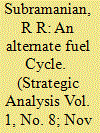

|
|
|
| 2 |
ID:
117319
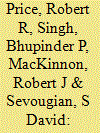

|
|
|
|
|
| Publication |
2013.
|
| Summary/Abstract |
We investigate the implementation of the principles of systems engineering in the U.S. Department of Energy's Fuel Cycle Technologies (FCT) Program to provide a framework for achieving its long-term mission of demonstrating and deploying sustainable nuclear fuel cycle options. A fuel cycle "screening" methodology is introduced that provides a systematic, objective, and traceable method for evaluating and categorizing nuclear fuel cycles according to their performance in meeting sustainability objectives. The goal of the systems engineering approach is to transparently define and justify the research and development (R&D) necessary to deploy sustainable fuel cycle technologies for a given set of national policy objectives. The approach provides a path for more efficient use of limited R&D resources and facilitates dialog among a variety of stakeholder groups interested in U.S. energy policy. Furthermore, the use of systems engineering principles will allow the FCT Program to more rapidly adapt to future policy changes, including any decisions based on recommendations of the Blue Ribbon Commission on America's Nuclear Future. Specifically, if the relative importance of policy objectives changes, the FCT Program will have a structured process to rapidly determine how this impacts potential fuel cycle performance and the prioritization of needed R&D for associated technologies.
|
|
|
|
|
|
|
|
|
|
|
|
|
|
|
|
| 3 |
ID:
047560
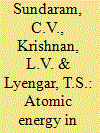

|
|
|
|
|
| Publication |
New Delhi, Department of Atomic Energy, 1998.
|
| Description |
277p.
|
|
|
|
|
|
|
|
|
|
|
|
Copies: C:1/I:0,R:0,Q:0
Circulation
| Accession# | Call# | Current Location | Status | Policy | Location |
| 043185 | 333.7924/SUN 043185 | Main | On Shelf | General | |
|
|
|
|
| 4 |
ID:
152070
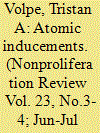

|
|
|
|
|
| Summary/Abstract |
This article argues for an updated strategy to limit the spread of sensitive nuclear technology around the globe. Traditional efforts by the United States to deny countries access to enrichment and reprocessing (ENR) technology are becoming difficult to enforce, while the threat of sanctions against US allies with legal nuclear-energy programs is not credible. As a result, the United States should shift toward a strategy of “buying out” an ally’s ambition for sensitive nuclear technology. Offering military, political, and economic assistance in exchange for stringent nonproliferation commitments will only work when offered at the earliest stage of technical development, before the country builds capabilities that will be difficult or expensive to give up. While there are some practical challenges to implementing such a strategy, the conditions are right to see if lucrative nuclear-energy offers—notably spent-waste management solutions—can induce countries with new civil nuclear programs to foreclose the option to develop ENR technology in the future.
|
|
|
|
|
|
|
|
|
|
|
|
|
|
|
|
| 5 |
ID:
110366
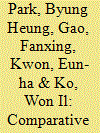

|
|
|
|
|
| Publication |
2011.
|
| Summary/Abstract |
As a nation develops its nuclear strategies, it must consider various aspects of nuclear energy such as sustainability, environmental-friendliness, proliferation-resistance, economics, technologies, and so on. A nuclear fuel cycle study could give convincing answers to many questions in regard to technical aspects. However, one nuclear fuel cycle option cannot be superior in all aspects. Therefore a nation must identify its top priority and accordingly evaluate all the possible nuclear fuel cycle options. For such a purpose, this paper examined four different fuel cycle options that are likely to be plausible under situation of Republic of Korea: once-through cycle, DUPIC recycling, thermal recycling using MOX fuel in PWR (pressurized water reactor), and SFR (sodium cooled fast reactor) employing fuel recycling by a pyroprocess. The options have been quantitatively compared in terms of resource utilization and waste generation based on 1 TWh electricity production at a "steady-state" condition as a basic analysis. This investigation covered from the front-end of the fuel cycles to the final disposal and showed that the Pyro-SFR recycling appears to be the most competitive from these material quantitative aspects due to the reduction of the required uranium resources and the least amount of waste generation.
|
|
|
|
|
|
|
|
|
|
|
|
|
|
|
|
| 6 |
ID:
076379


|
|
|
| 7 |
ID:
076774
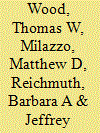

|
|
|
|
|
| Publication |
2007.
|
| Summary/Abstract |
Iran has pursued an ambitious nuclear program with the declared goal of long-term energy independence. While this is a worthwhile and generally accepted national planning objective, it is clear that Iran's nuclear program as now structured will not achieve this goal, and in fact may delay it by diverting capital and other resources from projects that would address pressing current energy sector problems and contribute to ultimate energy independence for Iran.
|
|
|
|
|
|
|
|
|
|
|
|
|
|
|
|
| 8 |
ID:
061001


|
|
|
| 9 |
ID:
076805
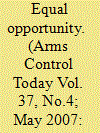

|
|
|
| 10 |
ID:
110360


|
|
|
|
|
| Publication |
2011.
|
| Summary/Abstract |
Economic growth in East Asia has rapidly increased regional energy, and especially, electricity needs. Many of the countries of East Asia have sought or are seeking to diversify their energy sources and bolster their energy supply and/or environmental security by developing nuclear power. Rapid development of nuclear power in East Asia brings with it concerns regarding nuclear weapons proliferation associated with uranium enrichment and spent nuclear fuel management. This article summarizes the development and analysis of four different scenarios of nuclear fuel cycle management in East Asia, including a scenario where each major nuclear power user develops uranium enrichment and reprocessing of spent fuel individually, scenarios featuring cooperation in the full fuel cycle, and a scenario where reprocessing is avoided in favor of dry cask storage of spent fuel. The material inputs and outputs and costs of key fuel cycle elements under each scenario are summarized.
|
|
|
|
|
|
|
|
|
|
|
|
|
|
|
|
| 11 |
ID:
099514
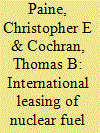

|
|
|
|
|
| Publication |
2010.
|
| Summary/Abstract |
Current International Atomic Energy Agency safeguards do not provide adequate protection against the diversion to military use of materials or technology from certain types of sensitive nuclear fuel cycle facilities. In view of highly enriched uranium's relatively greater ease of use as a nuclear explosive material than plutonium and the significant diseconomies of commercial spent fuel reprocessing, this article focuses on the need for improved international controls over uranium enrichment facilities as the proximate justification for creation of an International Nuclear Fuel Cycle Association (INFCA). In principle, the proposal is equally applicable to alleviating the proliferation concerns provoked by nuclear fuel reprocessing plants and other sensitive nuclear fuel cycle facilities. The INFCA would provide significantly increased nonproliferation assurance to its member states and the wider international community by holding long-term leasehold contracts to operate secure restricted zones containing such sensitive nuclear facilities.
|
|
|
|
|
|
|
|
|
|
|
|
|
|
|
|
| 12 |
ID:
082872
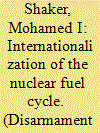

|
|
|
| 13 |
ID:
100431
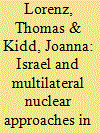

|
|
|
| 14 |
ID:
094524
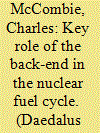

|
|
|
| 15 |
ID:
066986
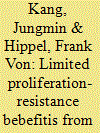

|
|
|
| 16 |
ID:
156584
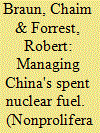

|
|
|
|
|
| Summary/Abstract |
China, as the world leader in constructing new nuclear reactors, has yet to resolve either its short-term spent nuclear fuel (SNF) problems or the challenge of long-term final disposition. While it may be several decades before the fuel disposition question will be resolved, the near-term problem of establishing adequate interim SNF storage is much more acute. The state of nuclear-reactor development in China presents an opportunity to address SNF management issues at an early stage. This article outlines a scenario-based study aiming to inform SNF interim storage policy even while the final disposition solution remains uncertain. We describe a comprehensive model and show results from a crucial subset of issues—the logistics of SNF accumulation, transportation, and storage—and describe simple steps to strengthen the SNF storage system. Finally, we forecast when the current method of SNF disposition could break down and offer recommendations and guidance for further study.
|
|
|
|
|
|
|
|
|
|
|
|
|
|
|
|
| 17 |
ID:
149945
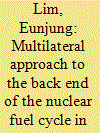

|
|
|
|
|
| Summary/Abstract |
In spite of the nearly unprecedented scale of the Fukushima Daiichi Nuclear Accident which caused countries around the world to review their nuclear power systems and to rethink their nuclear power expansion plans, nuclear power capacity continues to grow, spearheaded by the Asia-Pacific region. The Asia-Pacific has become a major emerging market for nuclear energy industry, which indicates that the management of spent nuclear fuel is likely to be a nuisance for the countries in this region in the coming decades. By reviewing the history of discussions on multilateral approaches to the back end of the nuclear fuel cycle and examining relevant empirical cases, this article aims to explore the feasibility of a multilateral approach to the back end of the nuclear fuel cycle in this region and provide some policy suggestions to enhance nuclear governance in the Asia-Pacific.
|
|
|
|
|
|
|
|
|
|
|
|
|
|
|
|
| 18 |
ID:
099999
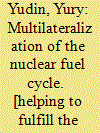

|
|
|
|
|
| Publication |
New York, United Nationas Publications, 2010.
|
| Description |
xiii, 67p.
|
| Series |
UNIDIR/2010/10
|
| Standard Number |
9789290451990
|
|
|
|
|
|
|
|
|
|
|
|
Copies: C:1/I:0,R:0,Q:0
Circulation
| Accession# | Call# | Current Location | Status | Policy | Location |
| 055468 | 333.7932/YUD 055468 | Main | On Shelf | General | |
|
|
|
|
| 19 |
ID:
062852
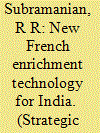

|
|
|
| 20 |
ID:
076723
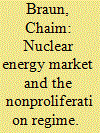

|
|
|
|
|
| Publication |
2006.
|
| Summary/Abstract |
This article presents a review of the sensitivities to proliferation attempts in each of the different stages of the commercial nuclear fuel cycle and within the nuclear power industry. As the global nuclear power industry may be on the brink of a major expansion that might rival its original growth at the inception of the nuclear age, the question is: Would this second expansion create uncontrollable proliferation risks in its wake? The basic answer is that the nuclear power industry in itself does not pose a direct proliferation threat; however, various elements of the nuclear fuel cycle could create different proliferation sensitivities if not safeguarded carefully. The first element of securing the nuclear fuel cycle is the understanding of which elements pose the greatest potential for successful proliferation attempts. These issues and several institutional and technical mitigation strategies to reduce the potential for possible proliferation are discussed here.
|
|
|
|
|
|
|
|
|
|
|
|
|
|
|
|